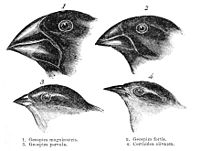
Photo from wikipedia
Abstract Several studies have demonstrated the ecological consequences of genetic variation within a single plant species. For example, these studies show that individual plant genotypes support unique composition of the… Click to show full abstract
Abstract Several studies have demonstrated the ecological consequences of genetic variation within a single plant species. For example, these studies show that individual plant genotypes support unique composition of the plants' associated arthropod community. By contrast, fewer studies have explored how plant genetic variation may influence evolutionary dynamics in the plant's associated species. Here, we examine how aphids respond evolutionarily to genetic variation in their host plant. We conducted two experiments to examine local adaptation and rapid evolution of the free‐feeding aphid Chaitophorus populicola across genetic variants of its host plant, Populus angustifolia. To test for local adaptation, we collected tree cuttings and aphid colonies from three sites along an elevation/climate gradient and conducted a reciprocal transplant experiment. In general, home aphids (aphids transplanted onto trees from the same site) produced 1.7–3.4 times as many offspring as foreign aphids (aphids transplanted onto trees from different sites). To test for rapid evolution, we used 4 clonally replicated aphid genotypes and transplanted each onto 5 clonally replicated P. angustifolia genotypes. Each tree genotype started with the same aphid genotype composition. After 21 days (~two aphid generations), aphid genotype composition changed (i.e., aphids evolved) and some tree genotypes supported unique evolutionary trajectories of aphids. These results suggest that plant evolution in response to human perturbation, such as climate change and invasive species, will also result in evolutionary responses in strongly interacting species that could cascade to affect whole communities.
Journal Title: Ecology and Evolution
Year Published: 2020
Link to full text (if available)
Share on Social Media: Sign Up to like & get
recommendations!